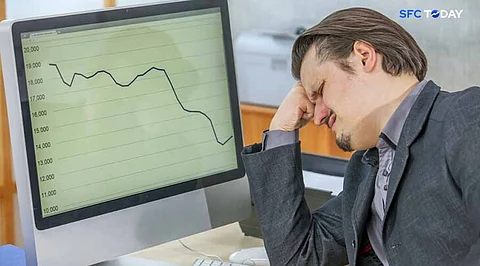

The trend within the stock market is a drastic downfall, and it gets investors worried about what might be in store. The central question on everyone's mind is whether this is a market correction or a full-blown crash. It is important to understand the difference between these two scenarios to be able to make the right investment decisions.
A market correction usually refers to a decline of 10% to 20% in the stock market from its recent peak. They normally happen after the stock prices have gone too high and the prices need to adjust to more sustainable levels.
On the contrary, a stock market crash is a sharp and deep price drop of 20% or more in a very short period. They often have potentially severe long-term effects on the economy and investor psychology compared to corrections.
At the moment, the stock is experiencing an abrupt fall, raising alarm bells in the minds of investors. Several factors contribute to this fall:
The latest economic data show the economy is sliding with rising inflationary trends. The latest data points suggest that the economy may be edging toward a stagflation scenario where economic growth stalls while inflation presents strongly. History teaches a lesson that stagflation is unique as it complicates the monetary policy of central banks, which challenges the banks to stimulate growth without pulling at the rope of inflation.
For instance, the U.S. Bureau of Labor Statistics proclaimed that the unemployment rate had increased to 4.3%. These numbers might be an indication of an approaching recession. This shift in employment figures indicates a lack of health in the economy as a whole. Such a situation typically results in less consumer spending and lower corporate earnings, two of the most significant stimulants to performance in stocks. There is a generally understood nexus between these economic indicators and stock market directions. The majority of investors seem to lose confidence when economic indicators start turning decidedly and worse off, and the huge sell-off eventuates.
Uncertainty with the current geopolitical tensions does not make matters any better than the already-receding market. With unending warfare and trade wars between two countries, there is a hold on everything in a great background of uncertainty. Danger regarding disruptions in supply chains, as well as raised tariffs, only gives way to reduced corporate profitability that would then affect stock valuation.
The geopolitical issues are expected to affect international trade agreements and regional economic stability of a region. It seems that time and again, geopolitical instability has led to market volatility and thus, in earlier trade wars or military conflicts, markets have responded negatively due to fear of lower global trade.
Inflation pressures therefore compel each central bank to increase interest rates. The higher interest rates make borrowing more expensive to firms and individuals, which will consequently negatively affect the economy. This inverse relation of interest rates with stock prices is therefore well-established because as borrowing costs become expensive, companies are also discouraged from financing growth initiatives or paying off debt, which would lower expectations of earnings.
Investors are watching the Federal Reserve through hawk-like eyes, as investors would like to have a better understanding of the direction of monetary policy and the path that takes with respect to fighting inflation. A higher interest rate with no improvement in leading economic indicators suggests a higher likelihood of a protracted stock market decline.
The disappointing corporate earnings news from the industrial material sectors sent stocks low. Many companies reported results that were lower than the market expectation. This led the anaysts and investors to reassess stock valuations. The failure to meet expectations triggered a wave of sell-offs as investors adjusted their expectations downward.
The linkage of stock price to business earnings is direct, as disappointing low levels of lower-than-expected earnings lead to reduced confidence in future profitability and cause investors to sell their holdings. That cycle can create a feedback mechanism whereby falling prices cut optimism regarding the ability of companies to earn in the future.
Various factors would determine whether the current fall of the stock index is a correction or a crash.
Investors must find an equally balanced method to ride a falling market:
A lot of opinions are being thrown around on whether the dramatic fall in the stock index is a market correction or a crash. Corrections are part and parcel of the market cycle, but crashes are much more abrupt and long-lasting. Investors will be better if they understand the situation, diversify their investments as much as necessary, and keep an eye on fundamentals.